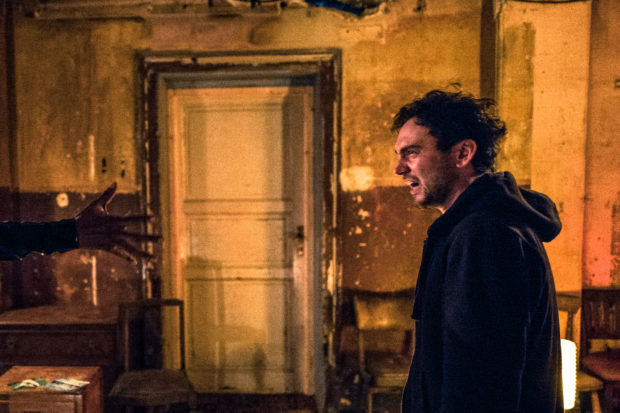You have no items in your cart. Want to get some nice things?
Go shopping
Viewed in retrospect, Philip Ridley’s first play seems like a manifesto for his trademark brand of theatrical horror; an early, self-aware classic of in-yer-face theatre. “They fell queasy – but they love it,” pronounces Cosmo Disney (Tom Rhys Harries). “That’s why they pay. And the queasier it gets the more they pay.” The Pitchfork Disney is a play in which live cockroaches are eaten, snakes are fried, and penises scrape along the tarmac. What does it say about us if we still clamour for theatre tickets?
The trouble with any revival of The Pitchfork Disney is that nowadays we’re harder to shock – one can expect to see on-stage rape even at the Royal Opera House. Since the play’s 1991 debut, playwrights have leapt at Cosmo’s advice that queasiness sells. Sarah Kane’s Blasted, Mark Ravenhill’s Shopping and Fucking and Martin McDonagh’s The Pillowman followed Ridley in bringing a new flavour of brutality to theatre. Audiences now seem largely desensitised to The Pitchfork Disney’s more extreme aspects – scanning faces during the most stomach-turning of Ridley’s monologues, I didn’t catch a single look of disgust.
A successful revival can’t rely on the play’s more sensationalist aspects alone, and instead should plumb the deaths of Ridley’s strange, heightened poetry to tease out the play’s subtleties. As well as a meta-theatrical examination of our desire to be scared, the play also explores how nihilism acts as a comfort blanket for Presley and Hayley Stray, two “ancient children” locked up in their apartment and fantasising about their neighbourhood’s destruction in a nuclear holocaust. “So many things can burn us up through no fault of our own,” worries Haley. “There’s nothing we can do to save ourselves.” The twins’ isolated existence is threatened by the arrival of Cosmo Disney and the Pitchfork Cavalier, two ghastly pub entertainers who have found a market in human fear.
The best moments in Jamie Lloyd’s production came when simple storytelling dominated. When Presley (George Balgden) describes for Cosmo his imagined post-apocalyptic landscape and bizarre recurring nightmare, Ridley’s twisted poetry had us spellbound. Cosmo listens with rapt, euphoric attention: does he see the Strays’ passive embrace of meaninglessness as the flipside of his amoral ethics of self-advancement, or recognise in Presley another performer capable of accessing the darker regions of the psyche? The entrance of the Pitchfork Cavalier (Sen Shote) and increased energy on Cosmo’s part brought a carnivalesque atmosphere – the scares packaged as a campy consumer product. It was a cross between end-of-the-pier entertainment and horror B-movie: as Cosmo would say, like riding “the ghost train.”
Other aspects of Lloyd’s interpretation showed less sensitivity to Ridley’s text. The play is suffused with dangerous sexual undercurrents which in Lloyd’s hands hit the audience with the subtlety of a sledgehammer – what Ridley meant symbolically Lloyd insists on taking literally. Though The Pitchfork Disney has met with a much kinder critical reception than Lloyd’s controversial reworking of Doctor Faustus last summer, both pieces share an occasional lack of nuance, forfeited in favour of relentless pacing and engaging physicality. Lloyd’s starry cast also occasionally delivered overcooked performances. Hayley Squires, nominated for a BAFTA for her role in Ken Loach’s I, Daniel Blake, seemed to play Hayley as raving mad – a somewhat one-dimensional take on Ridley’s drug-addled sleeping beauty.
George Blagden, better known for playing the dashing Louis XIV in the BBC’s sexed-up Versailles, seems oddly cast as Presley. His often understated performance seemed out of place alongside the more intense delivery of Squires and Rhys Harries. There was a general tension between Lloyd’s motions towards realism and the resistance put up by Ridley’s pointedly strange plot, dialogue and characters. Occasionally naturalism triumphed: we couldn’t be sure if the sounds we heard were part of the play or noises from the street above; the Strays could momentarily pass for real East Londoners. When the illusion was shattered by some odd phrasing on Ridley’s part or the increasingly strange action as the play reached its climax, it was hard to tell whether the jarring effect was what Lloyd had intended.
Outshining his better-known co-stars, Rhys Harries’ Cosmo acted as an injection of energy and tension. His jittery volatility, sleazy charisma and boyish good-looks made him just the kind of demonically enticing figure you imagine when reading the play. More than this, Rhys Harries humanised Cosmo. When he was visibly moved by Presley’s storytelling or experiencing what seemed like a gentle communion with Hayley it felt like we had peered past the showy exterior, only for Cosmo to wrong-foot us again and show the humanity we’d allowed him was misplaced.
Lloyd’s Pitchfork Disney is high on drama and tension, yet nothing new is teased out of the text or re-evaluated in a modern context. The theme of “ancient children”, for instance, could easily have fed into the ever-present thought-pieces on millennials self-entitlement. The press would have it that my generation are all a little like the Strays, terrified of the world and clinging to over-indulgent parents, and it would be fascinating to see Lloyd respond to this. Yet overall, this was a handsome take on Ridley’s seminal play, boding well for the premier of Killer, Ridley’s new anthology of monologues which is also directed by Lloyd at Shoreditch Town Hall and starts its run after The Pitchfork Disney closes.
The Pitchfork Disney continues at Shoreditch Town Hall until March 18. Tickets are available from £12.

About Simon Fearn
Simon is a student at Durham University and aspiring theatre critic. He has reviewed at the Edinburgh Fringe with EdFringeReview and is Stage Editor for Durham's student newspaper, Palatinate. He has also written music reviews for W!zard Radio and Cuckoo Review.




